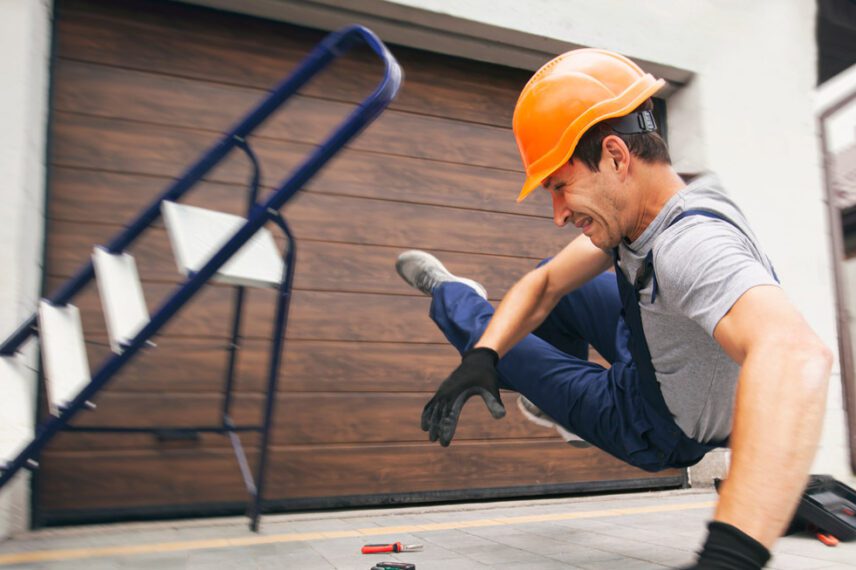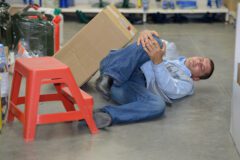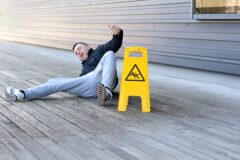Ladder Accidents: Can I Sue?

Falls can happen anywhere, but they’re incredibly commonplace when it comes to ladders. Many of these falls occur due to poorly constructed ladders placed on uneven ground or operated under generally unsafe conditions. Because most ladder falls occur at great heights, the degree of severity for injuries is multiplied, resulting in concussions, brain injuries, broken bones, and even death.
Not every ladder fall incident is the same; therefore, there are only certain instances where the victim can file a lawsuit. Let’s take a look at some of the most common scenarios below.
The Victim Uses the Ladder Inappropriately
One of the biggest reasons ladder accidents happen is due to user error. Most incidents occur when users don’t correctly place ladder feet in a stable and locked position, try to carry something unstable or heavy up the ladder, or lean it at an unsafe angle.
Because South Carolina is a state that upholds the rule of comparative negligence, a plaintiff’s recovery may be reduced in proportion to their own negligence so long as it doesn’t exceed the negligence of others. In other words, if the plaintiff was responsible for less than 50% of the accident, they may still be able to file suit. If they’re responsible for 50% or more of the accident, then the case is nil.
If you believe your ladder accident may have been caused by someone’s negligence rather than your own, it’s always best to consult with a lawyer to understand whether or not you have a potential case on your hands.
The Ladder Is Defective
If the ladder you were on suddenly failed, gave way, or collapsed, it’s possible a manufacturing defect caused your accident. Ladders must be designed and manufactured with the utmost safety precautions in mind, so when a company’s product fails to abide by those standards, it’s possible to file a product liability suit.
In fact, ladder accidents are so common that the federal government has established specific safety standards that all manufacturers are required to follow to ensure ladders are safely manufactured, including:
- Using slip-resistant ladder rungs
- Using no more than four ladder rungs above or within ten inches of another ladder or landing area
- Designing standard railings that spread at least three feet from the highest support point
- Ensuring that fixed ladders have a minimum of a 23-degree angle between two steps
- Making sure that A-Frame ladders must not exceed an angle of 20 degrees unless specifically designed for that purpose
In a product liability suit, a plaintiff may seek reparations from the manufacturing company and any other businesses along the supply chain that brought the product to market. Additionally, if a product fails to document the appropriate safety precautions in its manual, a plaintiff could file a marketing defect lawsuit in response.
Someone Else Causes the Victim to Fall Off of the Ladder
Sometimes, a victim falls off a ladder due to a third person’s negligent behavior. For instance, if the victim asked that person to hold the ladder steady as they climbed and that person walked away, leading to the fall, then they could potentially be held liable for their reckless actions.
Other instances could include a stranger knocking into the ladder due to not paying attention to their surroundings or a person setting up the ladder in an unsafe manner and assuring the victim it is safe.
Work-Related Ladder Falls
Another common place where ladder accidents tend to happen is at work. Typically, work-related ladder falls are classified under workers’ compensation claims, with only a few exceptions. Workers’ compensation is a type of workplace insurance covering all injuries on the job. It’s also a no-fault form of insurance, protecting employers from potential workplace lawsuits.
Ergo, any workplace fall on a ladder will likely be considered a workers’ compensation case. And while you may still receive compensation for your fall, this type of case will be handled differently from a slip-and-fall case.
Types of Damages You May Be Eligible for
Victims of ladder accidents are entitled to the same damages that victims of personal injury lawsuits are entitled to, including:
- Medical bills
- Future medical treatments
- Therapy costs
- Lost work wages
- Pain and suffering
- Disability payment
- Mental anguish
Have You Been Involved in a Ladder Accident?
If you’ve been the victim of a ladder accident, it’s imperative that you have your case evaluated by a skilled premises liability attorney. Slip and fall cases can be complicated and require extensive legal expertise to guarantee you receive the total amount of compensation you deserve.
Conclusion
If you’ve ever experienced the shock and fear of falling off a ladder before, you understand how ridiculously easy it is to get seriously hurt anytime you make the choice to climb up one. While most ladder accidents are due to user error, they can still be caused by unforeseen events such as manufacturing defects, faulty instructions, third-party responsibility, and unsafe working conditions.
Ladder fall cases can be complex, so it’s advisable to speak with an attorney as soon as possible to understand whether or not you have a potential lawsuit on your hands. An experienced slip-and-fall lawyer can guide you through the legal process, helping you to file paperwork, negotiate with insurance companies, and fight for the settlement you deserve.






